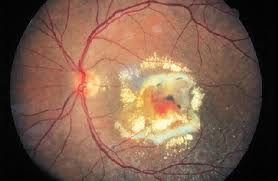In a well-controlled study that was published earlier in 2004 Dr. Johanna M. Seddon
has shown that age-related blindness (AMD) is caused from an inflammation in the blood vessels, which is associated with an elevated blood marker, called C-reactive protein (CRP). The authors of this study also showed that the dry form of AMD would tend to deteriorate with age and/or from smoking cigarettes into the more serious wet form, a common cause of blindness.
The inflammatory component of cardiovascular disease is known to be controlled by the use of aspirin (ASA) or the statins, medication that is known to lower the bad LDL cholesterol. It is with this background that the author of the study that I am reviewing here, Dr. Jacque L. Duncan from the University of California at San Francisco, has examined the effects of ASA and of statins on AMD. 326 patients with AMD (204 with dry AMD, 104 with wet AMD from blood vessels forming underneath the retina and 18 with geographic atrophy) were followed between January 1990 and March 2003. Patients were at least 60 years old or older and followed at the San Francisco VA Hospital Eye Clinic.
Dr. Duncan found that patients with blindness due to wet AMD used ASA or statins significantly less than patients with stable AMD. Moreover, he found that patients who had AMD and took statins were 49% less likely to develop wet AMD and if they took ASA the were 37% less likely to develop wet AMD.
The study also suggests that there is a link between the inflammatory process that leads to heart attacks and strokes on the one hand and the further deterioration to blindness when dry AMD is not treated on the other hand. The notion that inflammation is the missing link in both of these processes is a relatively new finding.
More information about Macular Degeneration here.
Based on article by Dr. Jacque L. Duncan in the American Journal of Ophthalmology 2004;137: 615-624.
Last edited October 26, 2014






